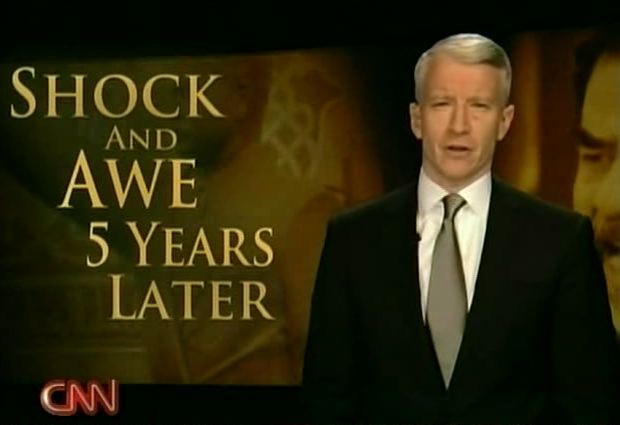
(to view just the portions of the program in which Michael is interviewed, go here)
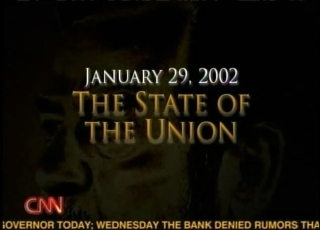
Length: 5:24
LARGE (63.3 MB) ----- SMALL (6.4 MB)
[NOTE: all video clips are in italics; current interview pieces are standard font]
SEN. BARACK OBAMA, (D) PRESIDENTIAL CANDIDATE: When it came to making the most important foreign policy decision of our generation, the decision to invade Iraq, Senator Clinton got it wrong.
SEN. HILLARY CLINTON, (D) PRESIDENTIAL CANDIDATE: He's attacked me continuously for having no hard exit date. And now we learn he doesn't have one. In fact, he doesn't have a plan at all.
SEN. JOHN MCCAIN, (R) PRESIDENTIAL CANDIDATE: They want to set a date for withdrawal. I believe that would have catastrophic consequences.
CLINTON: Senator McCain has said that it would be okay with him if American troops were in Iraq for 50 to 100 years. Well, it is not okay with me.
MCCAIN: Senator Clinton and Senator Obama said that we could not succeed militarily. We have.
OBAMA: I've got news for John McCain. He took us into a war, along with George Bush, that should have never been authorized.
ANDERSON COOPER, CNN ANCHOR: The race for the White House, the war in Iraq; the two are, of course, inseparable. Right now we're fast approaching a historic presidential election and at the same time, reaching a milestone in Iraq: five years. Five years of fighting and nearly 4,000 Americans killed.
Tonight, we look back at the war, without the spin, just the facts; from the run-up to "Shock and Awe" to Saddam's capture, the search for WMDs, IEDs, and the so-called surge. All of it as it happened.
The battle continues to be the greatest challenge facing our nation and the next president, be it Senators Obama, Clinton or McCain, are going to have to confront it on day one.
January 29, 2002
The State of The Union
GEORGE W. BUSH, PRESIDENT OF THE UNITED STATES: Iraq continues to flaunt its hostility toward America and to support terror. States like these and their terrorist allies constitute an axis of evil.
JOHN KING, CNN CHIEF NATIONAL CORRESPONDENT: It was clear even during the transition from the Clinton administration to the Bush administration that the new president thought you needed a new approach to Iraq, a tougher approach to Iraq that was much more skeptical about Saddam Hussein, his intentions and his capability.
BUSH: Iraq's weapons of mass destruction are controlled by a murderous tyrant.
ARI FLEISCHER:, FORMER WHITE HOUSE SPOKESPERSON: I don't remember anybody in America, especially in the party that now is so strongly opposed to the war, the Democratic Party, saying you're wrong, Saddam does not have biological or chemical weapons.
NIC ROBERTSON, CNN SENIOR INTERNATIONAL CORRESPONDENT: I remember getting a briefing, an off-the-record briefing before the war about one of the so-called suspected weapons sites.
They believe Iraq is embarking on a program to enrich uranium.
He showed me the site on satellite imagery. He told me what that site would have to require to have if it was currently being used for certain WMD production. And the Iraqis, amazingly enough, actually took us to that site.
And I remember looking around that site at the time before the war and thinking, you know, I don't see these key telltale factors, I don't see the high-power electricity coming in here.
February 5, 2003
United Nations
COLIN POWELL, FORMER SECRETARY OF STATE: Given Saddam Hussein's history of aggression --
KING: For the administration, Secretary Powell's presentation to the United Nations was it. It was the defining moment.
POWELL: For Saddam Hussein, possession of the world's most deadly weapons is the ultimate trump card, the one he must hold to fulfill his ambition.
KING: It was the credibility test of the Bush administration to the world. And not only in making that case, but in making it with the person in the administration who was viewed around the world as perhaps one of the most, if not the most credible voice in the Bush administration.
POWELL: Leaving Saddam Hussein in possession of weapons of mass destruction for a few more months or years is not an option. Not in a post-September 11th world.
ROBERTSON: I remember talking to some Iraqi officials and they said, forget the rhetoric, we get the picture here. This is-- the U.N. weapons inspections is just an excuse right now. You're going to come in and attack us anyway.
FLEISCHER: I think what weighed on the president was, if you don't make a decision like this, to take the weapons away from him, what do you do when he later uses them?
BUSH: My fellow citizens, events in Iraq have now reached the final days of decision.
KING: One of the great subplots of the whole debate is that in many ways Saddam Hussein sealed his own fate. In part by perhaps misunderstanding global politics and U.S. politics, but also in part because Saddam Hussein went out of his way to try to convince people that he was hiding something.
BUSH: All the decades of deceit and cruelty have now reached an end. Saddam Hussein and his sons must leave Iraq within 48 hours. Their refusal to do so will result in military conflict commenced at a time of our choosing.
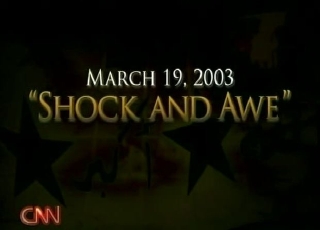
Length: 10:07
LARGE (117.1 MB) ----- SMALL (12.1 MB)
[NOTE: all video clips are in italics; current interview pieces are standard font]
March 19, 2003
"Shock and Awe"
ROBERTSON: The gun battle stronger now, picking up, closer into the city. Oh, very definitely the tracer rounds picking up.
I had got a suite on the top floor of the hotel for the exact purpose of being able to film "Shock and Awe." It had 270 degree view of the city.
Oh, huge flash, huge, huge, huge explosion. Get away from the window, get away from the window!
It looked right down over the main presidential compound right on the river in the center of Baghdad.
Okay, no need for panic, but a huge detonation there.
It was the best place to film "Shock and Awe."
BUSH: My fellow citizens, at this hour, American and coalition forces are in the early stages of military operations to disarm Iraq, to free its people, and to defend the world from grave danger.
GARY TUCHMAN, CNN CORRESPONDENT: This base is very busy. The last 24 hour reporting period, 296 sorties; that's about 40 more than the 24 hours before that. So we're talking about 550 sorties out of this base alone. And there are at least 38 different locations where coalition warplanes are coming from.
You are looking at one of the many patriot missile launchers.
While we were doing this story, sirens started wailing. We all ran into a bunker. I am sitting here with army men and women with their gas masks, their chemical suits on.
Those first few days, there was so much tension because nobody knew what was going to happen. Most people were convinced that weapons of mass destruction were going to be used.
DONALD RUMSFELD, SECRETARY OF DEFENSE: Our goal is to defend the American people and to eliminate Iraq's weapons of mass destruction and to liberate the Iraqi people.
Saddam Hussein is now taking his rightful place alongside Hitler, Stalin, Lenin, in the pantheon of failed brutal dictators, and the Iraqi people are well on their way to freedom.
FLEISCHER: I was standing next to the president watching the TV in the outer Oval Office when it happened. I remember him saying, "look at the crowd. It's not that big a crowd." He actually noticed that as the statue fell.
ROBERTSON: They are a people free at last to express what they really think.
FLEISCHER: When you saw Iraqis beating the statue with their shoes, you just saw that sense of jubilation, the eruption of joy against a tyrant.
ROBERTSON: They really seemed joyful and happy. But, again, at that time I was surprised there weren't more people out on the streets. And I think perhaps the Iraqis themselves had an inkling that this wasn't over.
This office is typical of what we're finding around Baghdad in the government buildings. Everything has been looted that seems to have been of just about of any value to the people.
The day after the statue came down, I'm talking to somebody, an Iraqi that I knew, and he said, "the troops, the American troops have got to stop this looting because if they don't, nobody is going to respect them."
Saddam was a dog, this man screams. But if the Americans don't help, we will revolt.
KING: There was no question that it was not that long into the war that you began to get reports from senior administration officials that the president and others were starting to ask where are the weapons?
UNIDENTIFIED MALE: So far you haven't mentioned that any of them has confirmed the existence of chemical and biological weapons. Does that make you uneasy?
RUMSFELD: No. I've believed all along we're not likely to stumble over anything.
ROBERTSON: The little that is left here does seem to support Iraqi government claims that this site was nothing more than a radio frequency testing and repair facility.
RUMSFELD: Nor did the inspectors stumble over anything. In good time, in good time.
HANS BLIX, FORMER HEAD OF THE IAEA: I had felt that the Iraqis have stopped inspectors many times during the 1990s and why would they do that if they didn't have something to conceal? But in two months I was quite certain that there wasn't anything.
MICHAEL WARE, CORRESPONDENT: I was assigned to do a story delving into the mystery of Saddam's weapons of mass destruction. I spoke to dozens and dozens of people. All of them told me variations of the same story, that there were no WMDs to be found.
KING: The overwhelming majority of the people on the president's staff and the president himself were wildly overly optimistic about how long this would take.
May 1, 2003
USS Abraham Lincoln
BUSH: Major combat operations in Iraq have ended. In the battle of Iraq, the United States and our allies have prevailed.
KING: They thought the Iraqis would melt like butter and it would be over quickly.
ROBERTSON: I was very surprised when Bremer came in and replaced Garner.
PAUL BREMER: Respect for the rule of law and respect for each other.
ROBERTSON: He gave an impression of being autocratic. He gave an impression as well of being a down-to-earth sort of guy, a can-do guy, a will-do guy, a guy who brought energy and enthusiasm. He wore those sort of desert combat boots with his suit into the office.
His decision to pull the plug on the Iraqi army, to disband the Iraqi army in May 2003 is probably one of the most significant events in the country. It essentially took away a natural security force in the country and turned upwards of half a million men loose who were trained in using weapons, who were trained in fighting.
WARE: I wanted to know where did all the troops go. They were sitting in their homes, discontent, disenchanted, and in so many ways disenfranchised. They'd lost their honor. They'd lost their income. The military had been disbanded by the Americans.
As one of them said to me one day, can you imagine having an American tank sitting in your street with foreign soldiers telling you where you can go and cannot go and what you can do? This is what led to the birth of the bulk of the insurgency.
FLEISCHER: There are pockets of violence. And most of those pockets of violence come from the people who defended the regime, who fought for the regime and are willing to die for the regime. And if they fight the United States, that will be their fate.
WARE: None of them were fighting for Saddam or a return of Saddam. They were fighting for their home, for their honor, for a sense of revenge, to reclaim some power. I didn't even see an expectation or a belief that they would reclaim the country itself. But they were certainly fighting for a seat at the table of power which they felt they had been denied.
ROBERTSON: A remote-controled explosive device set off by people waiting for the U.S. Troops to pass by.
UNIDENTIFIED SOLDIER: There were two people killed and three injured.
RUMSFELD: In those regions where pockets of dead-enders are trying to reconstitute, General Franks and his team are rooting them out.
December 14, 2003
Near Tikrit, Iraq
BREMER: We got him.
ROBERTSON: When the soldiers discovered Saddam Hussein, he came with his hands up. He said, "I'm Saddam Hussein, I'm the president of Iraq and I want to negotiate."
I climbed into that spider hole to see exactly what kind of space he was hiding in. And it was tiny. It was six foot long by a couple of feet high, a couple of feet wide. It was just about big enough to lie down inside and to get out you had to sort of squirm your way out through this small hole.
WARE: When the American Proconsul Paul Bremer gave that famous press conference where he announced that America had got him -- Saddam -- I was there watching it live with Baathist insurgents. And the range of reactions and emotions that moment elicited among these Baathist fighters was extraordinary.
A few just hung their heads and went quiet; mourning not so much the loss of Saddam but the body blow on Iraqi and Sunni pride that it represented. Others were angry; angry at Saddam for being caught. Angry at their former leader for not fighting to the death as his sons had done not so long before.
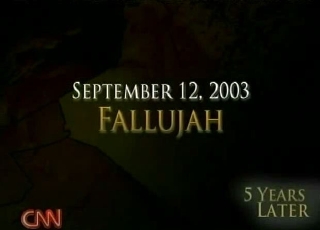
Length: 6:52
LARGE (80.6 MB) ----- SMALL (7.9 MB)
[NOTE: all video clips are in italics; current interview pieces are standard font]
WARE: Fallujah very much was a boiling point in the history of the insurgency that marked and anointed Al Qaeda in its ascendancy.
September 12, 2003
Fallujah
ROBERTSON: We had gone to Fallujah to cover the funerals of about ten Iraqi policemen. They were killed by U.S. troops, by the 82nd Airborne. It was a case of friendly fire, mistaken identity.
We're asking for revenge, he says. Fallujah is united. They all want retaliation.
And just as we were beginning to walk away from the center of Fallujah, in this big crowd I saw a guy on a motor bike. He had one of those red keffiyahs, red and white keffiyehs wrapped around his face, you could just see his eyes. And he had a rocket-propelled grenade launcher with a rocket-propelled grenade on his shoulder and I thought, that's an insurgent.
That was the first time I had interviewed an insurgent. The first time I had seen one, come face to face with one and I realized that this crowd was beginning to change.
WARE: The flashpoint was in the spring of 2004 when four American contractors in two separate vehicles were ambushed as they were passing through the center of the city. And their bodies were taken from the car, mutilated and burned and two of them were strung up on one of the bridges leading west out of Fallujah.
BUSH: They want to run us out of Iraq. The violence we have seen is a power grab by these extreme and ruthless elements.
KING: To have those pictures of the contractors hanging on the bridge and to have the headlines that the United States was, in essence, retreating from a place that it had been in command and control of speaks for itself.
WARE: I remember one very senior Sunni insurgent leader telling me, we know we cannot defeat America on the battlefield. No way. It's the greatest military on earth, we cannot. But we will defeat them and we'll defeat them on that, he said, and he pointed to a television screen.
BUSH: There is no justification for the brutal execution of Nicholas Berg.
CHRISTIANE AMANPOUR, CNN CHIEF INTERNATIONAL CORRESPONDENT: They were very sophisticated, the way they played the media. I mean, it was revolting. So it had that rolling effect of the gathering storm of fear and intimidation.
WARE: Zarqawi gave birth to Al Qaeda in Iraq. Zarqawi and others went shopping for a new platform to create their new war. And they found it served to them on a platter in Iraq with the invasion.
Muqtada al-Sadr
ROBERTSON: Muqtada al-Sadr, I think -- the so-called firebrand Shia cleric -- is perhaps one of the defining figures for me. Because here was a guy right back in 2003, he wasn't selected for the governing council.
And when he didn't make the cut for the governing council, he built what he called Muqtada al Sadr's militia, rose up and really showed their strength. He showed that he was a force to be reckoned with.
April 28, 2004
Abu Ghraib
KING: Abu Ghraib was the humiliation of prisoners that turned out to be the humiliation of the United States of America. The administration knew that. The administration knew this was a horrible, heinous, reprehensible, inexcusable, indefensible act.
RUMSFELD: The actions of the soldiers in those photographs are totally unacceptable and un-American.
BUSH: I want to tell the people of the Middle East that the practices that took place in that prison are abhorrent and they don't represent America.
FLEISCHER: The president called and he said to me we are making so much progress, so many good things were happening until Abu Ghraib.
June 28, 2004
Transfer of Power
KING: If you go back through all of the time in Iraq where there were so many times that the administration thought it had found the reset button.
RUMSFELD: The handover will happen and it will make a lot of people very unhappy.
KING: First it was when Paul Bremer went in, then it was first the provisional government.
BREMER: We welcome Iraq's steps to take its rightful place with equality and honor among the free nations of the world.
KING: Every one of those turned out to be, no, it didn't deliver the progress they thought it would.
LT. GENERAL THOMAS METZ, COMMANDER, MULTINATIONAL CORPS: Fallujah has been the cancer that when the cancer is removed, it will impact other places.
WARE: The battle of Fallujah itself was the most horrid and horrific affair on both sides.
RUMSFELD: Success in Fallujah will deal a blow to the terrorists in the country.
WARE: Photographer Yuri Kozyrev and I went in there for "Time" magazine with the only American Army group that joined thousands of marines to retake that city. We were in the very first vehicles with the very first platoon to enter that city the night the battle began.
What I saw men do those days and nights in the battle of Fallujah will live with me forever.
November 2004
Battle for Fallujah
Though Fallujah fell as it was always going to, to the might of the American military, the insurgents knew they could not withstand that, but that was not the point.
It was using it while they could as a sanctuary to arm, equip, train, recruit and organize that was its value. And in defending it as they did, to the bitter end, was the great symbolic gesture that's still celebrated to this day. Not just in Iraq but elsewhere in the Arab world.
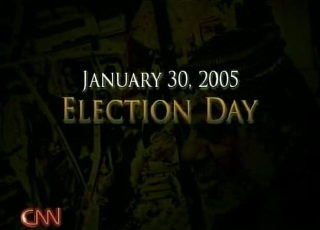
Length: 8:04
LARGE (93.3 MB) ----- SMALL (9.6 MB)
[NOTE: all video clips are in italics; current interview pieces are standard font]
January 30, 2005
Election Day, Iraq
BUSH: Today, the people of Iraq have spoken to the world. And the world is hearing the voice of freedom from the center of the Middle East.
AMANPOUR: This was going to be the turning point. And to their credit, the Iraqis played the game very well.
Behind me you can see people being searched before they enter the polling station.
Sadly, after that excessively hopeful and wonderful day, and the true emotion of watching these people defy danger, and they raised their two fingers and they, you know, had the ink stains on them to say that we believe and we want to go forward like this. And it was an amazingly emotional day.
The promise of that moment has not been fulfilled; until this day it's still not fulfilled.
CANDY CROWLEY, CNN SENIOR POLITICAL CORRESPONDENT: At the time, it was what Republicans and certainly the Bush White House saw as, you know, an example to the American people, you see, here is what the sacrifice is for.
But once it happened once and then it happened again, and in between there was all of this bloodshed and there didn't seem to be any political progress, it began to lose power.
ROBERTSON: I remember watching little humvees; unarmored, soft skinned humvees running around the city. Then you would see flak jackets hung over the side of the humvees to protect the soldiers inside. Then you would see them with this light armor protection bolted on, sometimes it was handmade by the soldiers because they couldn't get the vehicles that they needed to protect themselves.
November 19, 2005
Haditha
This cemented for many Iraqis what they feared and believed in some cases was happening in Iraq, that U.S. troops were wantonly killing Iraqis. This was the worst of all images to create for the Iraqis.
WARE: The Golden Dome Mosque in the small city of Samarra just north of Baghdad.
BUSH: This senseless attack is an affront to people of faith throughout the world.
WARE: When those militants made their way into that lightly guarded complex and set their explosive charges and blew that golden dome into dust, it lit a fire that has yet to barely go out.
AMANPOUR: The Samarra mosque bombing unleashed more than a year of the worst violence that Iraq had seen. Practically a civil war between the Sunnis and the Shiite, unbridled violence; revenge, revenge and counter-revenge.
ZAIN VERJEE, CNN CORRESPONDENT: Today there were attacks on three Sunni mosques.
WOLF BLITZER, CNN ANCHOR: Another bloody day in Iraq.
SOLEDAD O'BRIEN, CNN ANCHOR: Three car bombs ripped through a Baghdad neighborhood.
ROBERTSON: That was exactly what al Qaeda and Abu Musab al-Zarqawi wanted. They wanted to create this civil war in Iraq. They wanted to create the sectarian warfare. Why did they want to do that? They wanted to do that because they wanted to make it ungovernable for the United States and for the Iraqi government. They wanted the United States out of Iraq.
UNIDENTIFIED SOLDIER: Can you back the vehicle up? Pull it out. Son of a ---. Well, welcome to freaking Iraq.
UNIDENTIFIED SOLDIER: We ran into some issues with IEDs. IEDs are just all over the place here.
ROBERTSON: This is the type of roadside bomb that soldiers say they're finding a lot of now. It's made of plastic so it can't be picked up with metal detectors. Just two of these bombs here can almost destroy a tank.
UNIDENTIFIED SOLDIER: Still got a few miles to go.
UNIDENTIFIED FEMALE: I'm nervous all the time.
ROBERTSON: They're putting the bombs on the roads because they don't have the power and strength to come toe to toe with you and they know that this is a good way to attack you.
BUSH: We will complete our mission in Iraq and leave behind a democracy that can govern itself, sustain itself and defend itself.
ROBERTSON: Muqtada al Sadr's militia rose up and really showed their strength. This was a very bloody and violent militia that also began to play a part in the sectarian warfare, play a significant part in the Shia politics.
When the elections came along, Muqtada al Sadr won a significant following and support. When the current prime minister, Nuri al Maliki, became prime minister, he needed Muqtada al Sadr's support to win the position of prime minister.
May 20, 2006
Iraqi Government Sworn In
KING: The White House says this dramatic trip was about a month in the planning.
The picture that Bush wanted he got; a handshake with the new prime minister.
President Bush greeting the new Iraqi prime minister who was told just five minutes before Mr. Bush walked in the room that he would have a special guest from Washington.
He was careful but optimistic that they had found the guy who would be, as he would put it, the partner with the United States. It didn't take long for people to say, wrong again.
WOLF BLITZER, CNN ANCHOR, "THE SITUATION ROOM": The most wanted man in Iraq is dead.
AMANPOUR: Everybody hoped that when Zarqawi, the head of al Qaeda in Iraq was killed, that it would somehow kill off the insurgency. It didn't. It didn't. It wasn't about one person. It was about the permissive environment, to use a military term.
UNIDENTIFIED SOLDIER: Two killed and 35 wounded. I shed a lot of tears over it. My heart's broken.
CROWLEY: There was no real picture of those coffins, which really tends to hit Americans very hard. What we did have, however, were continuing stories of the vets who came back wounded, maimed, blind, severe head injuries. There were a lot of stories we saw, and that brought home the price of the war.
I think that was a very powerful image that moved the American people on the politics of the war.
November 5, 2006
Saddam Hussein Sentenced to Death
BUSH: Saddam Hussein's trial is a milestone in the Iraqi people's efforts to replace the rule of a tyrant with the rule of law.
WARE: It was the old Saddam again during the trial.
SADDAM HUSSEIN (through translator): I don't want you to call them, I want you to order them.
WARE: That infuriated some and inspired others. But his guilt was never in question.
HUSSEIN: Execution by hanging. Long live the people, down with the traitors.
AMANPOUR: Everybody hoped that once the Iraqis, especially the Sunnis and the insurgents saw that their leader was actually well and truly in jail and going to face judgment, their insurgency would peter out. It didn't. It kept going.
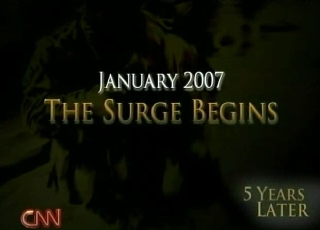
Length: 5:16
LARGE (61.7 MB) ----- SMALL (6.2 MB)
[NOTE: all video clips are in italics; current interview pieces are standard font]
BUSH: The situation in Iraq is unacceptable to the American people.
January 2007
The Surge Begins
It is clear that we need to change our strategy in Iraq.
KING: The president's critics call him this go it alone cowboy-diplomacy, uncompromising idealogue. You go back and look at his history as governor and as president, he on any number of occasions has compromised.
GENERAL DAVID PETRAEUS, COMMANDER, MULTINATIONAL FORCE, IRAQ: The stakes are very high. The way ahead will be hard and there undoubtedly will be many tough days.
UNIDENTIFIED SOLDIER: It is tense right now. This guy is very uneasy.
ROBERTSON: There was a need to change the way that the war was being fought and you needed to use counterinsurgency and General Petraeus has been credited with a lot of that, sort of drawing up a road map, if you will.
UNIDENTIFIED SOLDIER: It's hard to trust people when you come down here and you fight all the time. Some of those people are people that you fought before.
WARE: The key element of the surge is the deals; the deals with the Sunnis. Letting the Sunnis arm themselves and protect themselves; enlisting the insurgents instead of fighting them, so that they are no longer attacking American troops and many fewer American soldiers are dying. It's a part of the surge.
What would have happened to me on these streets when Al Qaeda was here?
My body would have been fed into a meat grinder, this Sunni militia commander tells me.
ROBERTSON: Al Qaeda hasn't gone away. They're going to be there for a long time to come. As long as there are U.S. troops, al Qaeda is going to have a rallying banner to draw people to come and fight for it. They'll probably end up fighting whichever government is ultimately established in 10 or 15 or 20 years' time.
WARE: We thread our way through rival militia checkpoints and pass undetected through Iraqi army positions.
Segregating the capital Baghdad into Sunni and Shia enclaves, literally guarded by militia checkpoints on either side and hemmed in by monstrous concrete blast walls that divides these populations and keeps them apart from killing each other is a key part of the surge.
Do you think this government will ever be able to embrace the Sunni groups?
The government is not loyal to its country, says this U.S.-backed Sunni commander.
Battering Iraqi politicians' heads against each other to force them to come to agreements, pass legislation and to stop intoning the name of sectarian violence and promoting it is a key part of the surge.
ROBERTSON: There is an opportunity for the future to look better than the recent past in Iraq. There is an opportunity for compromise. But if it's not grasped quickly, then violence could flare up again. The tensions exist beneath the surface.
OBAMA: The surge is a tactic and the broader question is, has the strategy in Iraq been successful?
KING: To the degree that people look at the surge and say progress has been made, General Petraeus obviously is someone who gets and deserves to get the credit for that.
MCCAIN: You look at what's happened over the last year, in the view of most objective observers, it's a pretty remarkable improvement.
KING: Senator McCain visited the Shorjah market just up the road a bit a year ago as part of a high-profile effort to suggest security already was dramatically improving. But it took more than 100 troops to escort him and provide security for the visit. And a year later the neighborhood remains highly volatile, unsafe for an American to visit, and under the control of radical cleric Muqtada al Sadr's Mehdi army.
ROBERTSON: Muqtada al Sadr is a player, he wants to be a player, he believes in whatever means he needs to remain powerful and the fact that his militia has been stood down, he's sort of taking them off active violence and that has allowed the situation to calm.
KING: People always say that McCain is attached to Bush. I think you could make the case that in some ways McCain is more attached to Petraeus.
CLINTON: Despite the evidence, President Bush is determined to continue his failed policy in Iraq until he leaves office. And Senator McCain will gladly accept the torch and stay the course.
KING: If the Democrats can succeed in saying this would be a third Bush term, this guy may never bring the troops out of Iraq, then McCain will lose.
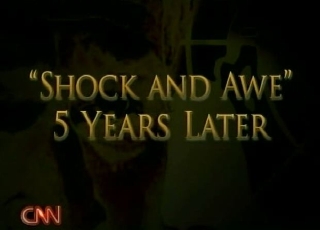
Length: 5:35
LARGE (65.4 MB) ----- SMALL (6.5 MB)
[NOTE: all video clips are in italics; current interview pieces are standard font]
BUSH: Five years into this battle, there is an understandable debate over whether the war was worth fighting, whether the fight is worth winning, and whether we can win it. The answers are clear to me. Removing Saddam Hussein from power was the right decision. And this is a fight America can and must win.
KING: Iraq is an issue in terms of what do we do about this war that now roughly 2/3 of the American people think was a bad idea?
The Race for The White House
CLINTON: When that moving van finally pulls away from the White House, America will be back.
OBAMA: I'm running for president because it's time to turn the page on a failed ideology.
CROWLEY: What the Democrats most want is a candidate who will stand up there and say, I'm going to get us out of Iraq. John McCain made a comment not too long ago about how, well, we may have to stay there for 100 years --
UNIDENTIFIED MAN: President Bush has talked about our staying in Iraq for 50 years.
MCCAIN: Maybe 100, as long as Americans are not being injured or harmed or wounded or killed.
CROWLEY: He didn't mean in a battle but nonetheless, it was picked up by the Democrats.
CLINTON: On the very first day I would ask the Secretary of Defense, the Joint Chiefs of Staff and my Security Advisor to begin working on a plan that I could start bringing our troops home within 60 days.
OBAMA: On day one, I will end this war. Not because politics compels it. Not because our troops cannot bear the burden, as heavy as it is. But because it is the right thing to do.
CROWLEY: Whether it's John McCain, Hillary Clinton or Barack Obama, they all have made great pains to say, I'm going to tell you the truth. I'm going to be the straight shooter.
The American public is hardened on the idea of this war. They have decided this war wasn't worth it.
KING: Any new president of the United States will find himself or herself having to change some of the things he or she promised in the campaign, based on simple reality or a new political calculation. That's a fact. It happens to every president.
The Future of Iraq
WARE: Prime Minister Nuri al Maliki has extreme limits to his power.
NURI AL MALIKI, PRIME MINISTER OF IRAQ (through translator): We've told the Iranians and the Americans, we know you have a problem with each other, but we're asking you to please solve your problems outside of Iraq.
WARE: Prime Minister Nuri al Maliki is aware of the realities, not just of history and shared ties between Iraq and Iran; but the realities of this region and the realities of the future.
AMANPOUR: The only way for a future in Iraq is for the Iraqi people and the Iraqi elected leaders to understand what it means by democratic government.
If you made the population satisfied, if you made the population believe in you, if you made the population have a stake in what was going on, because you were giving them direct benefits for their daily lives, then it would have been much more difficult for the insurgents to have that sympathy and that area to operate and to work their violent and terrible deeds.
PETRAEUS: We would love to win hearts and minds, but the truth is what we really want to do is help the Iraqis win hearts and minds of their own citizenry.
TUCHMAN: It's a different war now. Morale's changed. What hasn't changed is the courage of the troops. They're really very brave, back then, back now operating in environments that are unknown, mysterious and scary.
WARE: Soldiers, at the end of the day, when those bullets are flying past their heads, where war is about nothing but inches between those who survive and those who do not, they're fighting at the end of the day for their brother, and their brother is the man right next to them. That's who soldiers are fighting for.
It doesn't matter who sent them or why they sent them or what they're doing. Men will lay down their lives for each other and that's the nobility of men in combat.
And there's a certain sense of responsibility to keep telling the story. We're going to have to understand what happened here. And if I've been able to bear witness to just moments of that story, then I think I have an obligation to tell it.
COOPER: Michael Ware said the war will forever be a part of his life. I'm sure many of those who have served feel the same way. Iraq has changed our country, it's challenged it. Five years ago, few people thought the war would last this long. Where will we be five years from now? We can, of course, only wait.
We do know that the fighting in Iraq will still be here in November when we vote for the next president, a president faced with a war that is far from over.
I'm Anderson Cooper. Thanks for watching.
